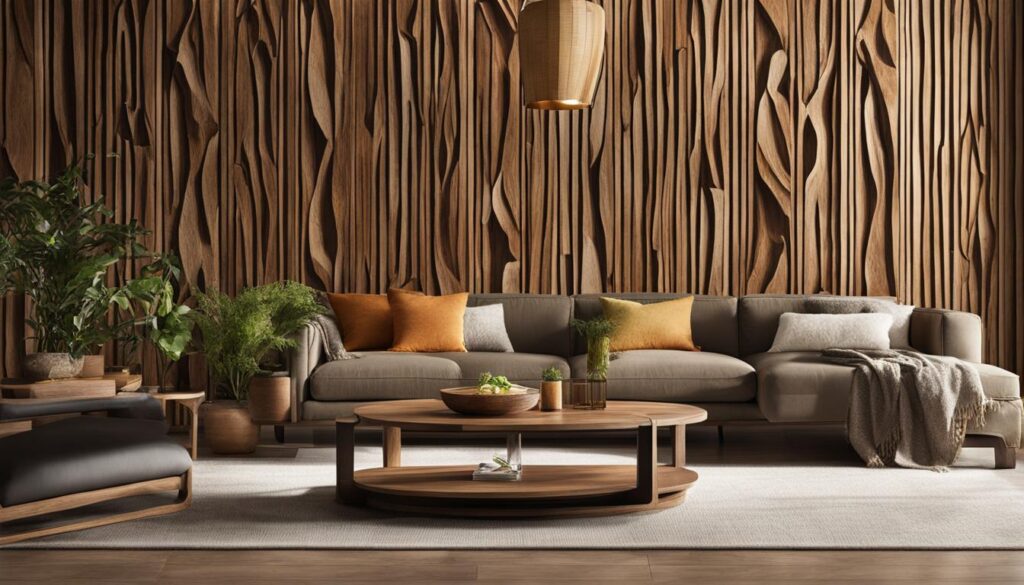Are you looking for a way to create a sustainable living environment while adding a touch of natural beauty to your space? Look no further than organic wood. This eco-friendly material is the perfect choice for those who value green living and pure materials.
Key Takeaways:
- Organic wood is a natural and eco-friendly material that promotes sustainable living.
- Incorporating organic wood into your green space enhances aesthetics and brings a sense of natural warmth.
- Choosing pure materials like organic wood contributes to a healthier planet and a more sustainable future.
What is Organic Wood?
Organic wood refers to wood that is sourced from sustainable forests and produced using environmentally friendly practices. It is free from harmful chemicals and synthetic treatments, making it a healthier and more natural choice for various applications. Organic wood showcases the natural beauty and unique grain patterns of different tree species, adding a touch of elegance to any space. It is a versatile material that can be used for furniture, flooring, decking, and more.
The Beauty of Organic Wood
Organic wood is renowned for its natural beauty and aesthetic appeal. Each piece of organic wood showcases the unique and intricate grain patterns of different tree species, creating a captivating visual display. The rich colors and textures of organic wood can instantly elevate the ambiance of any space, adding warmth and a sense of connection to nature.
“Organic wood brings a touch of elegance and authenticity to your living environment, allowing you to create a space that is truly one-of-a-kind.”
Versatility and Functional Excellence
The versatility of organic wood makes it an ideal choice for a wide range of applications. Whether you are designing furniture, flooring, decking, or cabinetry, organic wood can seamlessly blend into any style or decor. Its durability and resilience ensure that it will withstand the test of time, providing you with long-lasting and functional pieces for your home or office.
| Applications of Organic Wood | Benefits |
|---|---|
| Furniture | Enhances interior designs with natural beauty and elegance |
| Flooring | Creates a warm and inviting atmosphere |
| Decking | Resistant to weathering and provides a seamless transition between indoors and outdoors |
| Cabinetry | Brings a unique and eco-friendly aesthetic to kitchens and bathrooms |
Sustainable and Eco-Friendly Choice
By choosing organic wood, you contribute to a more sustainable future. Organic wood is sourced from well-managed forests that adhere to strict environmental standards. These forests prioritize replenishment and conservation efforts, ensuring the preservation of natural resources. Furthermore, organic wood has a lower carbon footprint compared to synthetic materials, helping to combat climate change.
- Organic wood is sustainably sourced from well-managed forests
- It promotes the conservation of natural resources
- Organic wood has a lower carbon footprint compared to synthetic materials
Embrace the Beauty of Organic Wood
Incorporating organic wood into your living environment allows you to create a space that is not only visually stunning but also environmentally responsible. Experience the natural beauty, durability, and versatility of organic wood and contribute to a greener future. Choose organic wood for your next project and enjoy the timeless elegance it brings to your space.
CLICK HERE TO CHECK OUR RECOMMENDED PRODUCTSBenefits of Organic Wood
Choosing organic wood has numerous benefits that make it an excellent choice for both your home and the environment. From its eco-friendly properties to its durability and low carbon footprint, organic wood offers a range of advantages that set it apart from synthetic materials.
Eco-Friendly and Sustainable
Organic wood comes from sustainably managed forests, ensuring the preservation of natural resources and promoting the growth of healthy ecosystems. By opting for organic wood, you actively support sustainable practices and contribute to the protection of our planet.
Durable and Long-Lasting
Organic wood is renowned for its durability, making it a smart investment for any space. Its natural resistance to wear and tear means that organic wood products, such as furniture and flooring, can withstand the test of time without losing their beauty or structural integrity.
Low Carbon Footprint
One of the key benefits of organic wood is its low carbon footprint compared to synthetic materials. Organic wood requires fewer energy-intensive processes in its production, resulting in reduced greenhouse gas emissions. By choosing organic wood, you actively contribute to combating climate change.

| Material | Environmental Impact |
|---|---|
| Organic Wood | Low carbon footprint, sustainably sourced |
| Synthetic Materials | Higher carbon footprint, derived from fossil fuels |
As you can see from the table above, organic wood outperforms synthetic materials when it comes to environmental impact. By choosing organic wood, you make a conscious decision to prioritize sustainability and reduce your carbon footprint.
With its eco-friendly attributes, durability, and low carbon footprint, organic wood is a natural choice for those who value both style and sustainability.
Applications of Organic Wood
Organic wood offers a plethora of applications, allowing you to infuse a touch of natural elegance into every corner of your space. Whether you’re looking to create stunning furniture pieces, elevate your flooring, design a beautiful decking area, or enhance your cabinetry, organic wood is the perfect choice. Its versatility and unique aesthetics make it a favorite among designers and homeowners alike.
Furniture
Organic wood is commonly used in furniture design, where its natural beauty and exquisite wood grains take center stage. From sturdy dining tables to intricate bookshelves and cozy bed frames, organic wood furniture pieces showcase the timeless appeal of nature’s craftsmanship. Each piece becomes a work of art that effortlessly blends function with aesthetic appeal.
Flooring
Imagine stepping onto a warm and inviting floor every day. Organic wood flooring can transform your space, adding a touch of nature’s charm to your home or office. Its rich hues and natural textures create an atmosphere of comfort and serenity, making it an ideal choice for bedrooms, living rooms, and even offices. Organic wood flooring is not only visually appealing but also durable, enabling you to enjoy its beauty for years to come.
Decking
Extend your living space into the great outdoors with organic wood decking. Whether you want to create a serene retreat or a vibrant entertainment area, organic wood decking provides a seamless transition from indoors to outdoors. Its weather-resistant properties ensure that your deck stands up to the elements while still radiating a natural ambiance. Enjoy the beauty of organic wood as you relax, entertain, and connect with nature.
Cabinetry
Add a touch of eco-friendly elegance to your kitchen and bathroom with organic wood cabinetry. The unique grain patterns of organic wood create a warm and inviting atmosphere, transforming these functional spaces into stylish sanctuaries. From sleek modern designs to rustic farmhouse aesthetics, organic wood cabinetry elevates the appeal and value of your home while contributing to a sustainable future.
To see the various applications of organic wood, take a moment to admire this stunning image:
CLICK HERE TO CHECK OUR RECOMMENDED PRODUCTSMaintaining Organic Wood
Maintaining organic wood is relatively simple. By following a few easy steps, you can ensure that your organic wood furniture, flooring, or decking continues to look its best for years to come.
Applying Natural Oils or Waxes
One key aspect of organic wood maintenance is periodic oiling or waxing. This helps nourish the wood and enhances its natural beauty. Choose natural oils or waxes specifically formulated for organic wood, as they provide the best protection and preservation. Apply the oil or wax according to the manufacturer’s instructions, allowing it to penetrate the wood and create a protective barrier.
Regular Cleaning for Optimal Beauty
To keep organic wood looking its best, regular cleaning is essential. Use a mild cleaner that is specifically designed for wood surfaces, ensuring that it does not contain harsh chemicals. Gently wipe down the wood using a soft cloth or sponge, removing any dust or debris. Regular cleaning helps prevent dirt buildup and maintains the wood’s natural luster.
“Regular cleaning helps prevent dirt buildup and maintains the wood’s natural luster.”
Avoiding Abrasive Methods and Harsh Chemicals
When cleaning organic wood, it is crucial to avoid abrasive cleaning methods or harsh chemicals that can damage the wood’s finish. Scrubbing with rough materials or using strong solvents can strip away the natural oils and protective coating, leaving the wood vulnerable to stains and discoloration. Stick to gentle cleaning techniques to preserve the integrity of the organic wood.
Organic Wood Maintenance Tips
| Tips | Description |
|---|---|
| Apply natural oils or waxes | Nourishes the wood and enhances its natural beauty |
| Regularly clean with a mild cleaner | Removes dust and debris to maintain the wood’s beauty |
| Avoid abrasive cleaning methods | Prevents damage to the wood’s finish |

By following these maintenance tips, you can ensure that your organic wood remains beautiful and durable for years to come. With regular cleaning, proper nourishment, and avoiding harsh chemicals, your organic wood will continue to be an elegant and sustainable addition to your living space.
Sustainability of Organic Wood
Organic wood stands as a testament to sustainable practices and responsible stewardship of our forests. By choosing organic wood, you make a conscious decision to support the preservation and conservation of our natural resources. It comes from forests that are managed with sustainability at the forefront, ensuring the delicate ecosystem’s balance remains intact.
Dedicated to maintaining the health and vitality of our forests, organic wood suppliers implement sustainable practices such as replanting and selective logging. These efforts not only ensure the longevity of the forests but also promote biodiversity and mitigate the environmental impact of wood harvesting.
Furthermore, many organic wood suppliers hold forest certifications, providing an added layer of assurance regarding responsible sourcing and management. Forest certifications, such as those from the Forest Stewardship Council (FSC) or the Sustainable Forestry Initiative (SFI), validate the adherence to strict standards and criteria for sustainable forest management.
By supporting organic wood and its sustainable practices, you play an active role in safeguarding the planet for future generations. The choice to incorporate organic wood into your living spaces demonstrates a commitment to a greener, more sustainable future.
| Benefits of Choosing Organic Wood | Contribution to Sustainable Practices |
|---|---|
| Promotes environmentally friendly living | Supports responsible forest management |
| Enhances aesthetics with natural beauty | Preserves biodiversity and ecosystem balance |
| Offers durability and long-lasting investment | Reduces environmental impact of wood harvesting |
| Low carbon footprint compared to synthetic materials | Validates responsible sourcing with forest certifications |
Choose Organic Wood for a Sustainable Future
“The earth provides enough for every man’s need, but not for every man’s greed.” – Mahatma Gandhi
As you embark on your journey towards sustainable living, let organic wood be the foundation of your choices. Its sustainable practices and forest certifications ensure a greener and more responsible approach to utilizing wood resources. Through your decision to support organic wood, you contribute to the overall health of forests, ecosystems, and the planet as a whole. Embrace the beauty of organic wood while championing a sustainable future.
CLICK HERE TO CHECK OUR RECOMMENDED PRODUCTSOrganic Wood vs. Synthetic Materials
When it comes to choosing materials for your home or furniture, considering the environmental impact and natural aesthetics is crucial. Organic wood and synthetic materials offer distinct differences that can influence your decision-making process. Let’s explore the characteristics of each and discover why organic wood stands out as the superior choice.
The Environmental Impact
Organic wood is a natural and renewable resource, sourced from sustainably managed forests. It undergoes minimal processing, resulting in a significantly lower carbon footprint compared to synthetic materials. On the other hand, synthetic materials are often derived from fossil fuels and require energy-intensive manufacturing processes, contributing to pollution and the depletion of finite resources.
Natural Aesthetics
Organic wood exhibits unparalleled natural aesthetics that can elevate the beauty of any space. Each piece of organic wood showcases unique grain patterns, adding a touch of authenticity and warmth. Synthetic materials may attempt to replicate the look of organic wood, but they lack the natural charm and elegance that organic wood brings. The natural aesthetics of organic wood create a connection with nature and provide a soothing visual experience.
“The warmth and authenticity of organic wood cannot be replicated by synthetic materials. Its natural aesthetics bring a sense of serenity and beauty to any environment.” – Interior Designer, Jane Thompson
The Verdict
When it comes to the environment and aesthetics, organic wood outshines synthetic materials. With its minimal environmental impact and natural beauty, organic wood allows you to create a sustainable and visually appealing space. By choosing organic wood, you contribute to the preservation of forests and support a more eco-conscious lifestyle.
Next, let’s explore the various applications of organic wood and witness how it enhances different areas of your home.
| Categories | Organic Wood | Synthetic Materials |
|---|---|---|
| Environmental Impact | Low carbon footprint, renewable resource | High carbon footprint, derived from fossil fuels |
| Aesthetics | Natural beauty, unique grain patterns | Artificial replication, lack of authenticity |
| Durability | Long-lasting, can withstand the test of time | Varies depending on the material |
| Maintenance | Minimal maintenance required | Varies depending on the material |
As you can see, the benefits of organic wood are unmatched when compared to synthetic materials. Its low environmental impact, natural aesthetics, durability, and ease of maintenance make it the superior choice for those seeking a sustainable and beautiful living space.
Conclusion
Organic wood is not only a sustainable choice but also a way to create a greener future. By incorporating this versatile and eco-friendly material into your furniture, flooring, or decking, you can embrace the essence of organic wood and contribute to a more sustainable living environment.
With organic wood, you can enjoy the beauty of nature in your space while minimizing your environmental impact. Its durability ensures that your investment will last for years to come, reducing the need for frequent replacements and reducing waste.
By choosing organic wood, you are choosing eco-friendly materials that support sustainable living practices. You become part of the solution by opting for a renewable resource that is sourced responsibly and boasts a low carbon footprint. Embrace the natural elegance and warmth of organic wood, and take a step towards a more eco-conscious lifestyle.
FAQ
What is organic wood?
Organic wood refers to wood that is sourced from sustainable forests and produced using environmentally friendly practices. It is free from harmful chemicals and synthetic treatments, making it a healthier and more natural choice for various applications. Organic wood showcases the natural beauty and unique grain patterns of different tree species, adding a touch of elegance to any space.
What are the benefits of organic wood?
Choosing organic wood offers numerous benefits. Firstly, it is an eco-friendly option as it comes from sustainably managed forests, ensuring the preservation of natural resources. Organic wood is also known for its durability, making it a long-lasting investment. Additionally, organic wood has a low carbon footprint compared to synthetic materials, contributing to reducing greenhouse gas emissions and combatting climate change.
Where can organic wood be used?
Organic wood can be used in various applications, adding a touch of natural elegance to any space. It is commonly used for furniture, creating stunning pieces that showcase the beauty of natural wood grains. Organic wood is also popular for flooring, offering a warm and inviting atmosphere. In outdoor spaces, it is ideal for decking, as it is resistant to weathering and creates a seamless transition between indoors and outdoors. Additionally, organic wood is often used for cabinetry, bringing a unique and eco-friendly aesthetic to kitchens and bathrooms.
How do you maintain organic wood?
Maintaining organic wood is relatively simple. It is recommended to apply natural oils or waxes periodically to nourish the wood and enhance its natural beauty. Regular cleaning with a mild cleaner and a soft cloth can help remove dust and keep the wood looking its best. It is important to avoid abrasive cleaning methods or harsh chemicals that can damage the organic wood’s finish. With proper care, organic wood can maintain its beauty and durability for many years.
Is organic wood sustainable?
Organic wood is a sustainable choice due to its production practices. It comes from forests managed with sustainable practices, such as replanting and selective logging to maintain the ecosystem’s balance. Many organic wood suppliers also hold forest certifications, ensuring responsible sourcing and conservation efforts. By choosing organic wood, you support these sustainable practices and contribute to the overall health of forests and ecosystems.
What are the differences between organic wood and synthetic materials?
When comparing organic wood to synthetic materials, there are significant differences in their environmental impact and aesthetics. Organic wood is a natural and renewable resource, while synthetic materials are often derived from fossil fuels and have a higher carbon footprint. Additionally, organic wood offers unique natural aesthetics, with each piece showcasing the beauty of its grain patterns. Synthetic materials may try to replicate the look of organic wood, but they lack the authenticity and warmth that organic wood provides.
